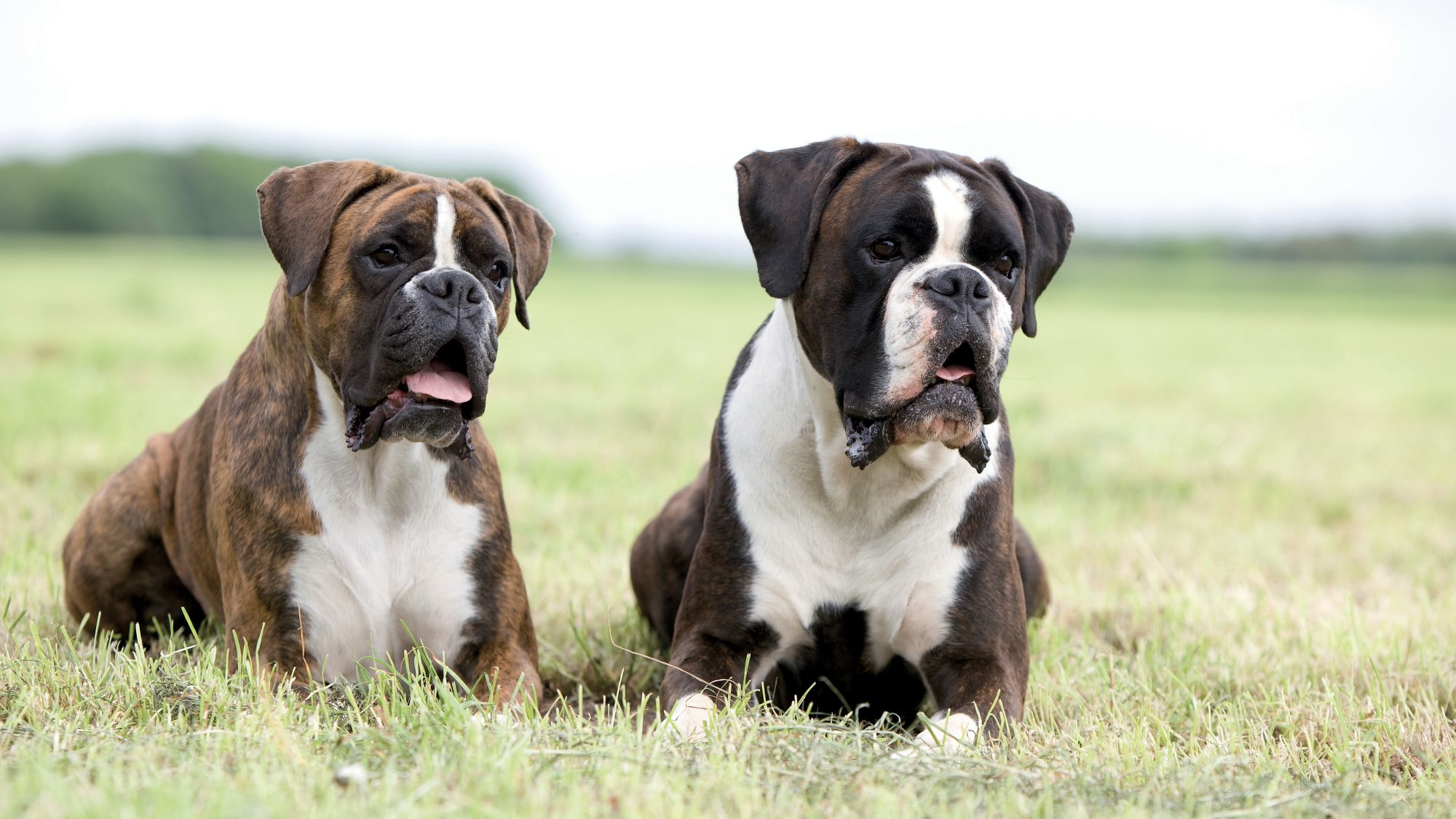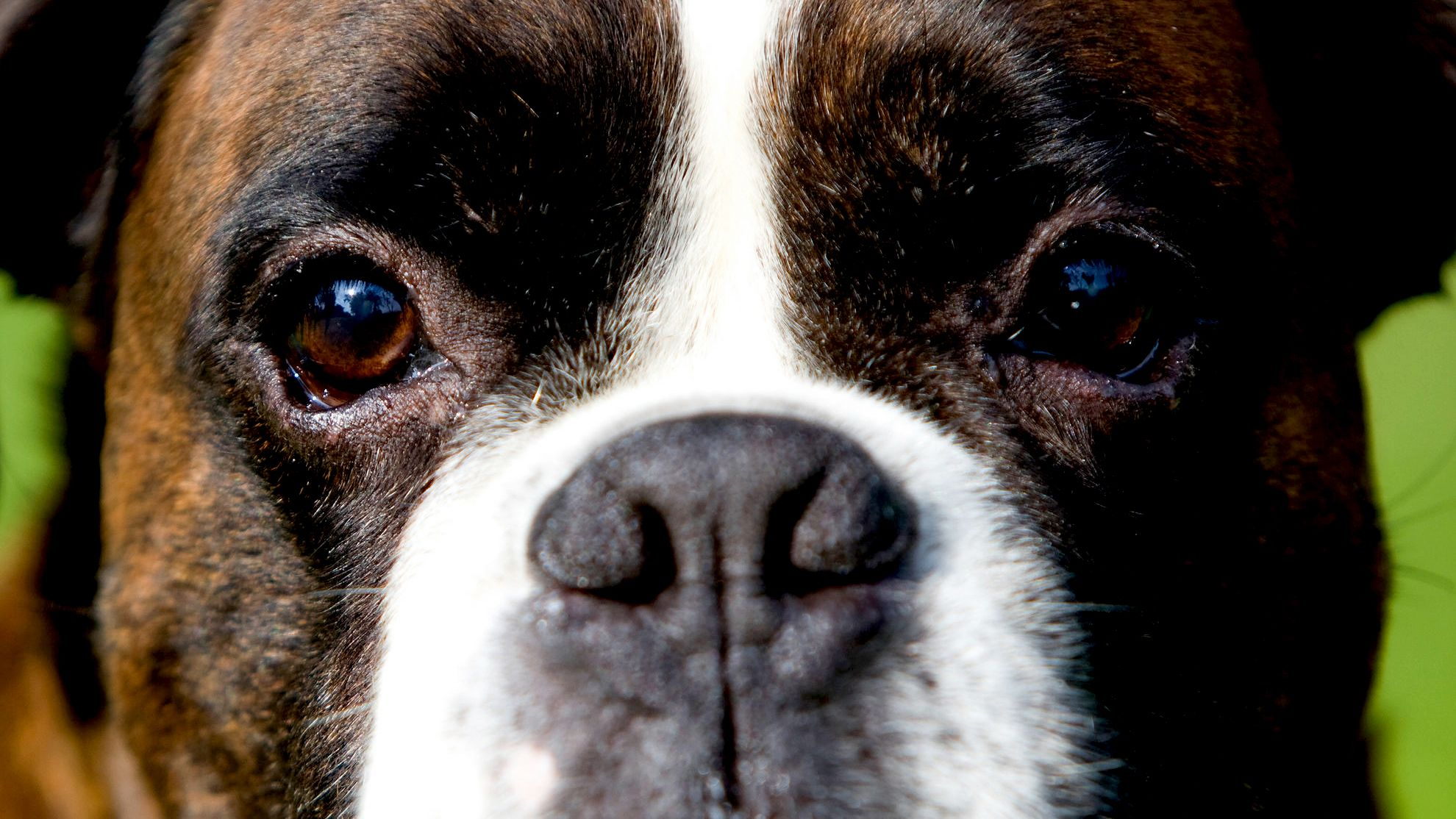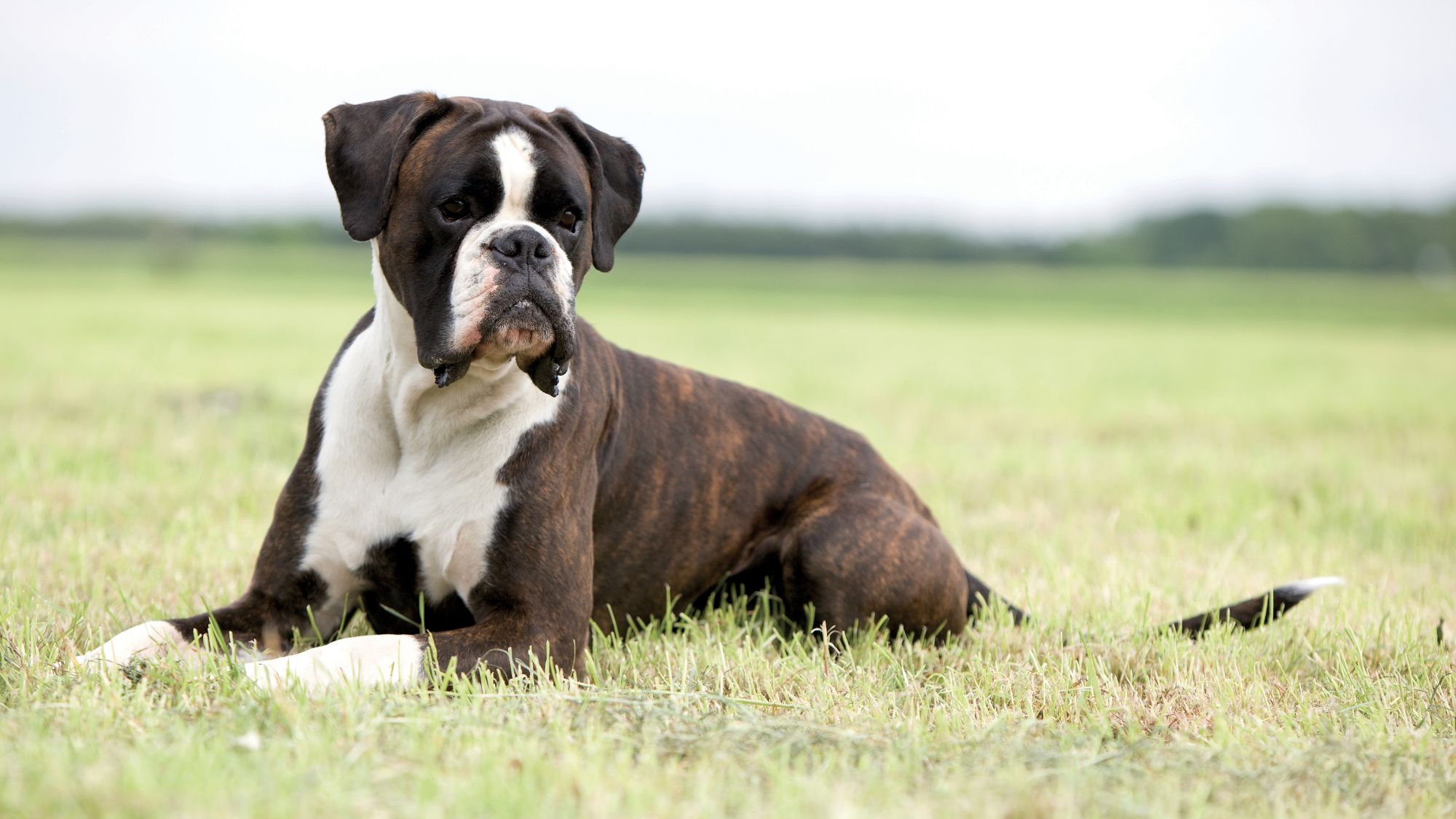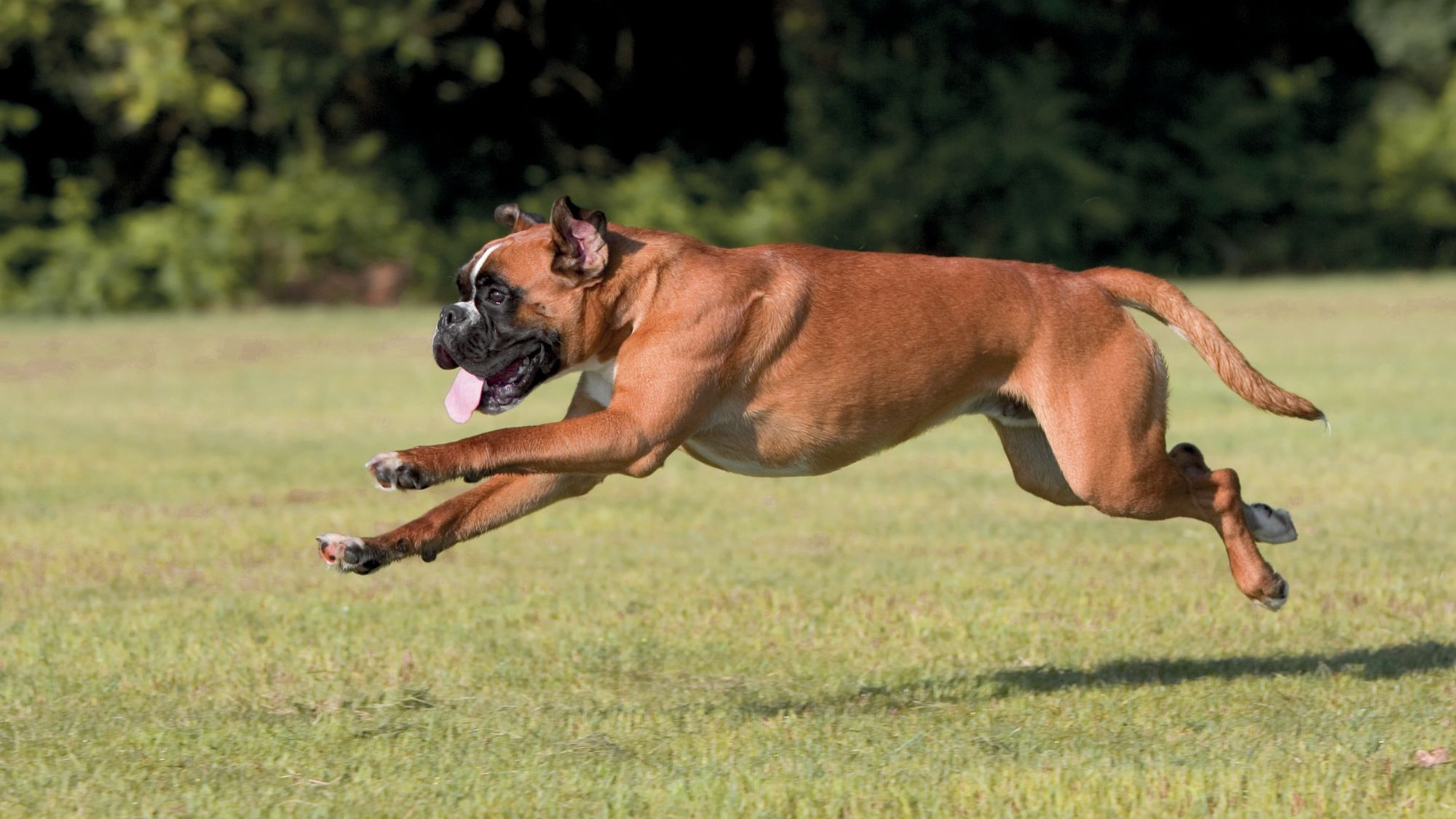Let's talk Boxers
Boxers are known for having a playful and friendly nature as well as their bouncy exuberance. Boxers also make loyal and devoted companions who develop deep attachments to their owners.
Official name: Boxer
Other names: German Boxer, Deutscher Boxer, American Boxer
Origins: Germany
Drooling tendencies
3 out of 5Grooming needs
1 out of 5Shedding Level
4 out of 5Barking tendencies
3 out of 5Energy level*
4 out of 5Compatibility with other pets
3 out of 5Warm weather?
1 out of 5Cold weather?
2 out of 5Suited to apartment living
3 out of 5Can be left alone
1 out of 5Family pet?*
4 out of 5
| Male | Female |
|---|---|
| Height | Height |
| 23 - 25 in | 21 - 23 in |
| Weight | Weight |
| 60 - 70 lb | 55 - 65 lb |
| Life stages | |
|---|---|
| Puppy | Adult |
| 2 to 15 months | 15 months to 5 years |
| Mature | Senior |
| 5 to 8 years | 8 to 18 years |
| Baby | |
| Birth to 2 months | |

Get to know the Boxer
All you need to know about the breed
They are also a very gentle, affectionate breed that form strong bonds with their families. Boxers are normally very careful and respectful to those around them. However, since they can sometimes be a little more boisterous than they intend, it’s best to keep very small children away—just in case—but otherwise, they are known for being a very trustworthy dog.
Protective and loyal as a breed, Boxers will bark fearlessly at anything they perceive to be a threat to their family, even if they are more likely to lick a stranger than anything else. Nonetheless, they make good watchdogs.
It’s important to note that Boxers need at least two hours of exercise a day. They will also benefit from some training classes early on in their lives. As long as they have those two things, along with plenty of love from their owners, Boxers will not be afraid to show their affection. It’s no wonder they are regarded as one of the most perfect family pets.

Two facts about Boxers
1. An extended puppyhood
Boxers have one of the longest puppyhoods out of any breed. It can take them around 15 months to be classed as an adult and around 3 years to fully mature.
2. Two of a kind
There are actually two kinds of Boxers, the standard Boxer and an American variant that has slightly different characteristics.
History of the breed
It’s hard to believe that the Boxers we know and love today began as ferocious hunting dogs. Yet, if we explore their history, that’s exactly what happened.
Descending from the old fighting dogs of Tibet—going back to their very distant roots—the Boxer dog of today hails from Western Europe. Their story begins in 19th-century Germany, with the Bullenbeisser ("bull biter") dog. Bullenbeissers were used by the German aristocracy to hunt prey, tackling everything from deer and boars to bears.
As traditional hunts fell out of favor the future of the Bullenbeisser looked uncertain. In the late 1800s everything changed when they were crossed with a smaller, mastiff-type breed from Britain, introducing the arrival of the modern Boxer.
Back in Germany, Boxers were among the first breeds used by the police and were also enlisted by the military during both World Wars. Today, despite their tough-guy origins, the Boxer dog is regarded as one of the friendliest breeds around.
In 1904, the breed was registered with the American Kennel Club and quickly became one of the most popular dogs in the country and frequently appear on lists of the "top 10 breeds" to this day.
From head to tail
Physical characteristics of Boxers
1.Body
Body is powerful with an athletic build and high muscle mass.
2.Head
3.Fur
4.Behavior
5.Tail

Things to look out for
From specific breed traits to a general health overview, here are some interesting facts about your Boxer
Prone to breathing issues
Boxers are a part of the brachycephalic breeds, meaning they are prone to health issues due to having a flat face, wide skull, and short nose. In particular, occasional breathing problems can occur if they get too excited (not unusual for Boxers, let’s face it) or overheated in hot weather. In severe cases, this can result in fainting. The best advice is to choose a responsible breeder, who will be trying to develop a healthier Boxer dog and seek advice from your vet before deciding on your Boxer.
Check them regularly for bumps and lumps
Another potential health problem for Boxers is their susceptibility to cancer. The good news is that early detection can make a big difference. Keep an eye out for any changes in your Boxer, such as breathing problems (a sign of lung cancer) or limping (a symptom of bone cancer). Additionally, white Boxers, as well as those with white markings, can be prone to skin cancer, so take precautions to minimize sun exposure. It’s also a good idea to discuss regular examinations with your vet.
Susceptible to heart disease
They are prone to a disease of the ventricles called 'Boxer Cardiomyopathy'. It was given this name as it is more common in Boxers than any other breed.
Tailored nutrition for Boxers

When choosing food for a Boxer, there are many factors to consider: their age, lifestyle, activity level, physiological condition, and health including potential sickness or sensitivities. Food provides energy to support their vital functions. A complete nutritional formula should have a balance of nutrients to avoid any deficiencies or excess in their diet. Also, clean and fresh water should be available at all times to support good health. In hot weather conditions make sure you are letting your dog have plenty of breaks and always have water on hand so they can stay hydrated.
The following recommendations are for healthy animals. If your dog has health problems, please consult your veterinarian who may recommend an exclusively veterinary diet.
Immune System Support
As puppies grow, they will experience big changes and new discoveries. During this key period, the puppy’s immune system develops gradually. Boxer Puppy helps support your puppy’s natural defenses with an exclusive complex of antioxidants including vitamin E.
Muscle Development
Made with a precise protein content and enriched with L-carnitine to support muscle development.
Digestive Health
Formulated with high quality protein (L.I.P.*) and prebiotics to support digestive health and a balanced intestinal flora, contributing to optimal stool quality. *Protein selected for its very high digestibility.
Exclusive Kibble: Special Brachycephalic Jaw
With a short muzzle, Boxers are a good example of a brachycephalic breed. Boxer Puppy kibbles are designed with an exclusive shape and size to make it easy for the Boxer puppy to pick up and chew.

The main nutritional goals for adult Boxers are:
Healthy Cardiac Function
Boxer breed dogs are known to be prone to cardiac sensitivity. Boxer Adult formula contains specific nutrients to help support healthy cardiac function: taurine, EPA and DHA.
Ideal Muscle Mass
Boxers have a low fat body mass and powerful muscles. Boxer Adult helps maintain muscle mass with a precise protein content (24% min). Enriched with L-carnitine.
Antioxidant Complex
This formula contains an exclusive antioxidant complex to support cellular health.
Exclusive Kibble: Special Brachycephalic Jaw
With a short muzzle, Boxers are a good example of a brachycephalic breed. Boxer Adult kibbles are designed with an exclusive shape and size to make it easy for the Boxer to pick up and to encourage him to chew.

After 5 years old, Boxers will start showing the first signs of aging. A formula enriched with antioxidants will help maintain their vitality, and specific nutrients, such as chondroitin and glucosamine, will support healthy bones and joints. Aging also brings changes in digestive capacity and specific nutritional needs, so food for older Boxers should have the following characteristics:
Vitality Support
Supports heart, kidney and brain health in first stage of aging.
Bone and Joint Support
A combination of minerals and nutrients to support the extra demands on a large dog's bones and joints.
Digestive Health
Easy-to-digest, high quality proteins, plus fibers and prebiotics to promote optimal stool quality.

Caring for your Boxer
Boxers have limitless amounts of energy so they need at least two hours of physical activity a day. This can be spread out between regular walks, playing in the yard, or a run in the park. However, it's important to note that Boxers don’t do well in hot weather. As a brachycephalic breed, they can sometimes struggle with their breathing. Additionally, remember to wait at least an hour after feeding before exercising your Boxer.
Boxers usually require minimal grooming. However, since they tend to shed year-round and their short, prickly hair can stick to carpets and upholstery, a daily grooming or stroking with a glove will help reduce the need for vacuuming. Also, they only need a bath occasionally—though be prepared for a bit of drooling. Also, like most breeds, Boxers' teeth should be brushed regularly—daily if possible—and they will need professional dental cleaning from time to time. Nails should be clipped as needed, and their ears should be checked weekly.
Given the Boxer’s naturally boisterous nature and tendency to jump up, early training is a good idea. Puppy classes are a helpful part of the socialization process—especially since male Boxers, in particular, may look to assert dominance over other dogs. Training can improve their tolerance towards other canines. Boxers are intelligent and are eager learn quickly and respond well to gentle encouragement. They also benefit from continued mental stimulation, as boredom can lead to destructive behaviors like chewing. Therefore, they don’t handle being left alone very well. Additionally, Boxers make for great therapy dogs.
7/7
Frequently Asked Questions about Boxers
Yes. Even though they are gentle and loving souls, Boxers are still very protective of their owner and are very vocal.
Boxers are actually highly intelligent dogs that will benefit from plenty of mental stimulation. They also enjoy human company and thrive under the spotlight of attention. The more time and energy you invest in them, the more you will get back.
Other breeds that might interest you
Read more on this topic
Sources
- All Boxer Info http://www.allboxerinfo.com/boxer-dog-health-problems
- Royal Canin Dog Encyclopaedia. Ed 2010 and 2020
- Banfield https://www.banfield.com/pet-healthcare/additional-resources/breed-information/dog-breeds
- Royal Canin BHN Product Book
- American Kennel Club https://www.akc.org/dog-breeds/boxer
Like & share this page